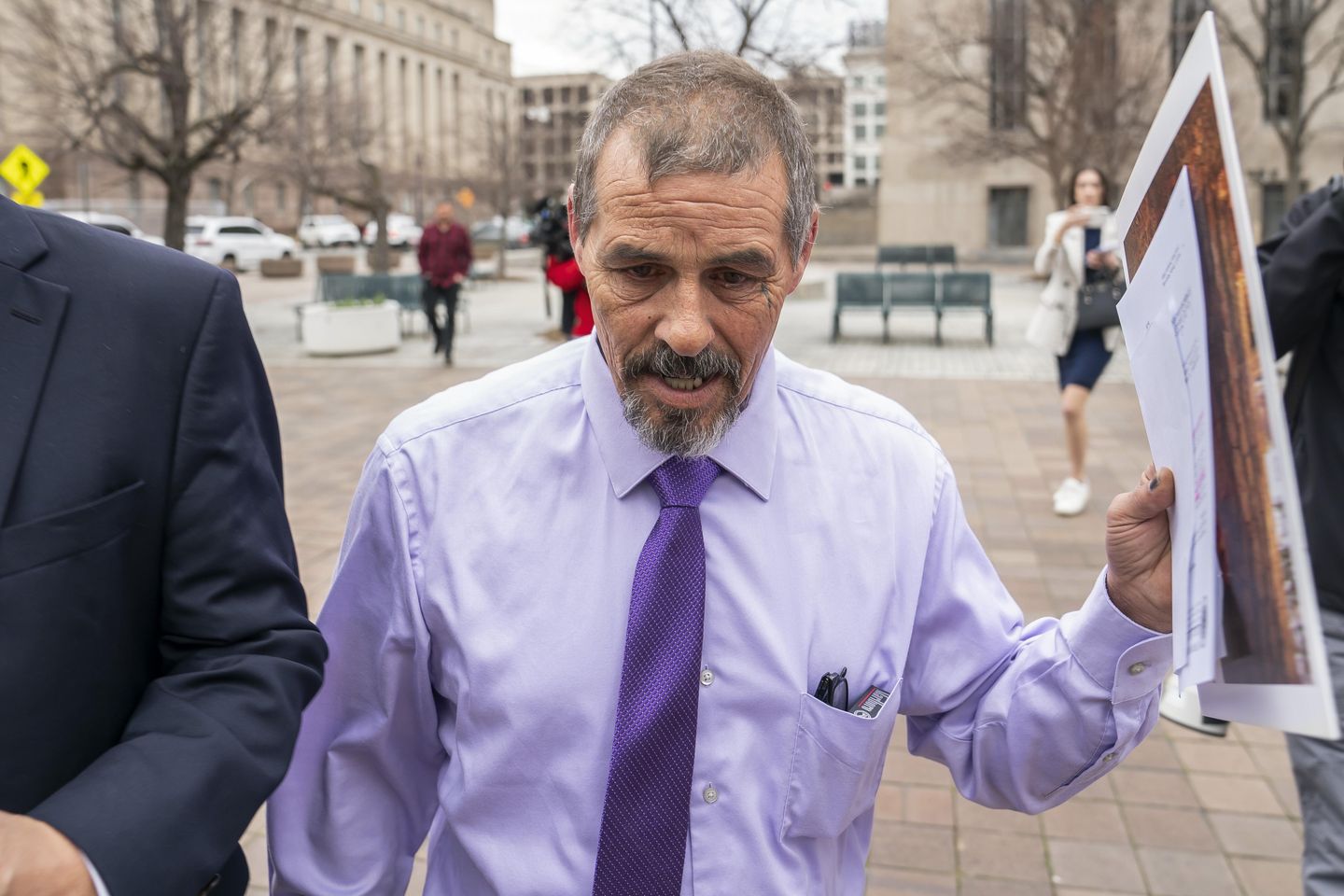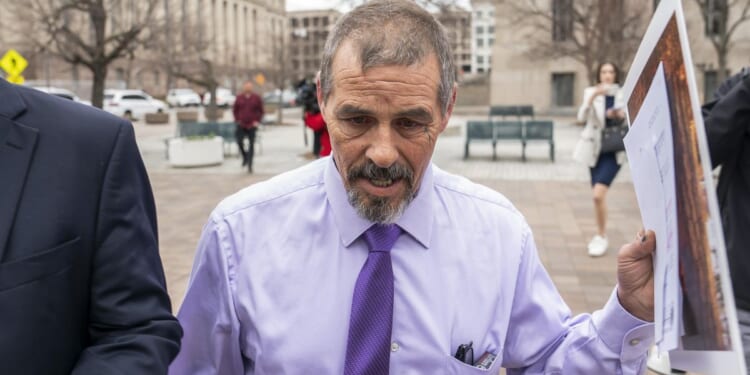
A man who paraded a Confederate flag through the U.S. Capitol on Jan. 6, 2021, will be released early from prison as the Supreme Court weighs the fate of hundreds of Capitol Hill protesters charged with obstruction by the feds.
Kevin Seefried was sentenced to 36 months in prison for a felony conviction as well as some misdemeanor charges for his participation in the Capitol demonstration against what marchers called a rigged 2020 election.
His felony conviction came from the same charge lobbed against hundreds of Jan. 6 defendants by the feds, and the Supreme Court has decided to review the count next month.
U.S. District Judge Trevor McFadden, a Trump appointee, on Tuesday said Seefried could be released May 31 — one year after he was incarcerated — as the Supreme Court reviews the felony charge. He reasoned the end of May was sufficient time to meet Seefried’s sentences for the misdemeanor charges.
“The riot on January 6th was the culmination of a unique — indeed, never-before-seen — confluence of events. The Government provides the Court no evidence suggesting that any of the events that led to that riot are reasonably likely to recur. Nor does it point to any evidence that Seefried would participate in another riot if they did,” the judge wrote.
The feds argued Seefried shouldn’t be released pending the high court’s upcoming case, suggesting the nature of the election year could lead to the same “political maelstrom” seen on Jan. 6.
According to court papers, Seefried was one of the first protesters to enter the Capitol, where he carried a Confederate flag — “something that did not happen even during the Civil War—and used the flag to strike at a black police officer before chasing him through the building.”
A lawyer for Seefried didn’t immediately respond to a request for comment.
The legal challenge came as the Supreme Court will hear next month from Jan. 6 defendant Joseph Fischer, who accuses prosecutors of using an overly broad interpretation of “obstructing an official proceeding” to launch hundreds of cases, including against former President Donald Trump, stemming from the Capitol demonstration.
The case will be argued April 16, with a decision expected by the end of June. Until then, several defendants have successfully petitioned for early release.
U.S. District Judge Amit Mehta, an Obama appointee, ordered the release of Thomas Adams Jr., who was convicted of obstructing an official proceeding, while the Supreme Court reviewed the issue.
Adams was sentenced to 14 months in prison and three years of supervised probation. He has been in custody since August.
Another Jan. 6 defendant, Alexander Sheppard, also successfully petitioned for early release in light of the Supreme Court taking the Fischer case.
Sheppard was convicted on the same charge of obstructing an official proceeding, as well as other misdemeanors. He has been incarcerated since November on a 19-month sentence.
U.S. District Judge John D. Bates, a George W. Bush appointee, ordered Sheppard released in May after serving six months due to the high court‘s review of the contested felony obstruction charge.
Hardly all of the Jan. 6 defendants have caught an early release break.
One is John Strand. In February, U.S. District Judge Christopher Cooper, an Obama appointee, denied his request for early release over his obstruction charge. The reason was that Strand still had to serve time for his misdemeanor charges.
The Fischer case underscores how broadly the government applied the charge to demonstrators who entered the Capitol on Jan. 6.
Mr. Fischer, a former police officer in Pennsylvania, attended Mr. Trump’s “Stop the Steal” rally near the White House on Jan. 6 but didn’t immediately join the demonstration or enter the Capitol building.
He and a companion left town briefly but returned to the Capitol grounds and entered the building, though after the electoral vote count in Congress was suspended.
Mr. Fischer was inside the Capitol for four minutes, according to court records.
Video captured him handing handcuffs to an officer and patting him on the shoulder. Mr. Fischer was later pepper-sprayed in a crowd of protesters.
Federal authorities charged him with several counts related to the Jan. 6 protest, including an obstruction charge under Title 18 Section 1512, which pertains to tampering with a witness, victim or information.
Anyone convicted under the statute could face a fine and up to 20 years in prison.
A lower court judge dismissed the obstruction charges, ruling that prosecutors used the law too broadly. A divided panel of the U.S. Circuit Court of Appeals in Washington reversed that ruling and reinstated the charges, prompting an appeal to the Supreme Court.
The law in question is part of the Sarbanes-Oxley Act of 2002, which regulates financial recordkeeping and documentation.
Congress passed the Sarbanes-Oxley Act after the Enron accounting scandal. It was intended to preserve evidence for federal investigations.
Prosecutors have charged more than 300 of nearly 1,000 Jan. 6 defendants with violating the obstruction statute. At least 152 people were convicted or pleaded guilty to obstructing an official proceeding and more than 100 have been sentenced, according to a tally by The Associated Press.
Special counsel Jack Smith charged Mr. Trump with obstructing an official proceeding as part of the election tampering case that will go to trial in Washington.
The former president has asserted presidential immunity negates the federal criminal charges, and the Supreme Court is reviewing that claim separately on April 25.
About 1,200 people have been charged with crimes related to the Jan. 6 protest, and more than 700 of the defendants have pleaded guilty.












